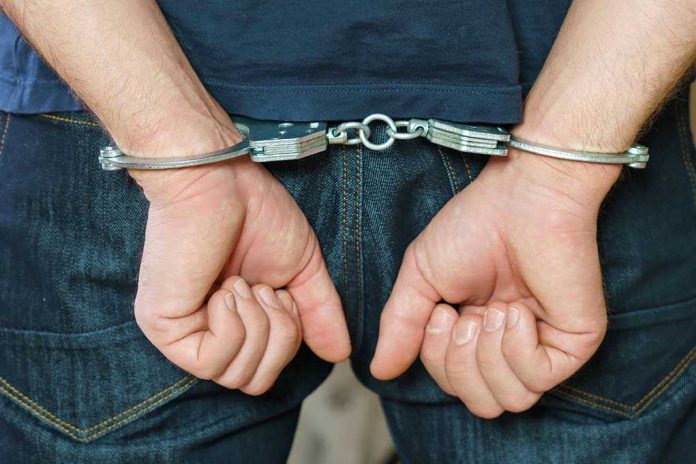
When organized crime infiltrated college athletics through a $2 million betting ring, it revealed how easily student-athletes can become both victims and accomplices in schemes that threaten the very integrity of amateur sports.
Story Overview
- Fourteen individuals, including alleged Lucchese crime family members, arrested for operating illegal sports betting ring from 2022-2024
- College athletes allegedly served as both bettors and sportsbook operators within the criminal network
- Federal prosecutors used offshore betting platforms to facilitate approximately $2 million in illegal wagers
- NCAA investigating implicated student-athletes who face potential permanent eligibility bans
- Case highlights persistent vulnerability of college sports to organized crime despite legalized betting expansion
The Lucchese Connection Runs Deep
Joseph “Little Joe” Perna, an alleged member of the notorious Lucchese crime family, stands accused of masterminding a sophisticated betting operation that stretched far beyond traditional mob activities. New Jersey prosecutors revealed that this wasn’t merely another underground poker game or neighborhood bookie operation. This was a calculated infiltration of college athletics that exploited the financial desperation of student-athletes while generating millions in illegal revenue through offshore betting platforms.
The operation’s sophistication became clear when investigators uncovered how the ring used offshore sites to evade U.S. gambling regulations. Between 2022 and 2024, approximately $2 million flowed through these channels, demonstrating both the scale of the operation and the continued appeal of illegal betting despite the rapid expansion of legal sportsbooks across America.
Student-Athletes as Operators, Not Just Victims
What distinguishes this case from historical sports betting scandals is the active role college athletes allegedly played as sportsbook operators themselves. Unlike past incidents where athletes were primarily targets for point-shaving or game manipulation, several student-athletes in this ring apparently ran their own betting operations within the larger criminal network. This evolution reflects both the sophistication of modern gambling technology and the entrepreneurial desperation of financially strapped college athletes.
The NCAA’s response has been swift and unforgiving. Any student-athlete found guilty of betting on their own institution’s games faces permanent ineligibility under current rules. With investigations ongoing, the careers of multiple college athletes hang in the balance, their futures potentially sacrificed for what prosecutors allege were short-term financial gains tied to organized crime.
Historical Echoes with Modern Twists
Sports betting scandals have plagued college athletics for decades, from the 1951 City College of New York point-shaving scandal to the 1978-79 Boston College incident that involved mobster Henry Hill. Each generation of corruption reveals new vulnerabilities while maintaining familiar themes: financially vulnerable student-athletes, organized crime seeking profit, and the persistent threat to competitive integrity.
However, the 2018 Supreme Court decision striking down PASPA and legalizing sports betting created an unexpected paradox. While legal betting increased transparency and regulation, it also normalized gambling culture around college sports, potentially making illegal operations easier to disguise. The current case demonstrates how organized crime adapted to this new landscape, using offshore platforms to circumvent legal channels while exploiting the increased gambling awareness among young athletes.
The NCAA’s Integrity Dilemma
The NCAA finds itself in a precarious position as legal sports betting partnerships generate millions in revenue for conferences and schools while simultaneously creating new avenues for corruption. The organization’s strict enforcement policies, including permanent bans for betting violations, reflect genuine concern about competitive integrity but also highlight the impossible standards placed on financially struggling student-athletes surrounded by gambling advertisements and partnerships.
Spencer Speziale, a certified NBA agent named as a defendant though not accused of direct betting activity, represents another troubling dimension: the potential involvement of sports industry professionals who should be protecting athlete interests. His inclusion in the indictment suggests the corruption extended beyond street-level operations into professional sports representation, raising questions about who student-athletes can trust for guidance.
Sources:
NCAA official statement on basketball student-athletes and betting violations
Seton Hall University scholarship on sports betting and college athletics
NBC Sports coverage of Mafia-backed betting ring
University of Colorado analysis of historic sports betting scandals
ESPN timeline of sports gambling scandals since 2018
ESPN report on 14 arrested in Mafia-backed betting ring
UNLV academic research on sports betting corruption



